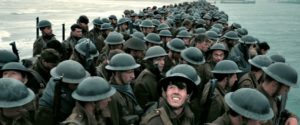Dunkirk
Posted on July 20, 2017 at 1:16 pm
A-| Lowest Recommended Age: | Middle School |
| MPAA Rating: | Rated PG-13 for intense war experience and some language |
| Profanity: | Some strong language |
| Alcohol/ Drugs: | None |
| Violence/ Scariness: | Wartime violence, guns, bombs, some disturbing and graphic images |
| Diversity Issues: | None |
| Date Released to Theaters: | July 21, 2017 |
| Date Released to DVD: | December 18, 2017 |

Christopher Nolan’s “Dunkirk” inspires the most unexpected adjectives for the true story of one of the defining moments of World War II, the rescue operation that saved more than 300,000 men and that defined the resolve of the Allied forces and, even more, of the civilians they were fighting for. You do not expect a war movie to be elegant, intimate, spare in story and dialogue, but this one is. There is almost no exposition or technical talk. It is also spectacularly, heartbreakingly beautiful, with breathtakingly gorgeous cinematography by “Intersteller’s” Hoyte Van Hoytema. And Hans Zimmer’s score is stunning, with a ticking clock (Nolan’s own pocketwatch), propulsive, elegiac, magisterial. You expect a big movie to be packed with stars. But Nolan cast unknown young actors in central roles and major stars in smaller parts.
This is not the usual historical epic. It is more poem than prose, more experience than narrative.
As the movie briefly reminds us, the German army had pushed the French and British Allies to the coast. It looked like defeat. Through the eyes of one very young soldier who looks almost indistinguishable from the 400,000 others, we see the chaos and terror, shots coming from nowhere (the sound department deserves an award for the visceral noise of the guns), no one in charge. Nolan makes it clear without overdoing it that war is not just hell; it is the chum of sending millions of boys into a meat grinder.
He makes it to the beach where we see the scope and scale, thousands of soldiers standing in line for ships that are not coming.
Nolan has a masterful control of the story in three different strands, operating over different time periods. The great miracle of Dunkirk was the more than 800 small private boats that crossed the English Channel to bring the soldiers home. They are represented here by the invaluable Mark Rylance, representing the essence of “Keep Calm and Carry On.” He sets off with his teenage son and a young friend. That happens over a day. Taking place in just hours, pilots take off to provide support, warned to be mindful of their fuel and make sure they leave enough to get home. And then there are those on the beach, the Army and Navy officers (James D’Arcy and Kenneth Branagh), who know too well the endless triage of war strategy, and the soldiers trying to stay alive. The details are beautifully precise, a nurse handing exhausted soldiers tea, the look in the eye of a soldier trying to decide whether to doom one man to save the lives of dozens, or in the eye of another watching helplessly as a fellow soldier, in despair, walks into the water.
History is written by the victors, according to Winston Churchill, the then brand-new British Prime Minister whose famously inspiring words of determination are read aloud by a soldier at the end of the film. An historian himself, he was of course right. From some perspectives, this story was a loss, not a victory. But ultimately, history is written by the survivors, decades, even centuries later. Nolan’s film could only have been made by a cinema master with the perspective of time and all the history since, and we are fortunate to be here when he did.
NOTE: Nolan, director of the “Dark Knight” films, cast two of his Batman villains in this film, Cillian Murphy and Tom Hardy. Those who appreciate what he did with time here will also enjoy his films “Inception” and “Memento.”
Parents should know that this is a wartime story based on historic events with guns and bombs. Characters are injured and killed. A soldier commits suicide and another sacrifices himself to save others. There is some strong language.
Family discussion: Why were the soldiers surprised by the way their evacuation was seen by the British people? Who should decide who has to leave the ship?
If you like this, try: the 1958 film, also called “Dunkirk,” starring John Mills, Richard Attenborough, and Bernard Lee, 2017’s WWII drama “Their Finest,” which includes a depiction of a propaganda film about the Dunkirk rescue, and the upcoming “Churchill”
